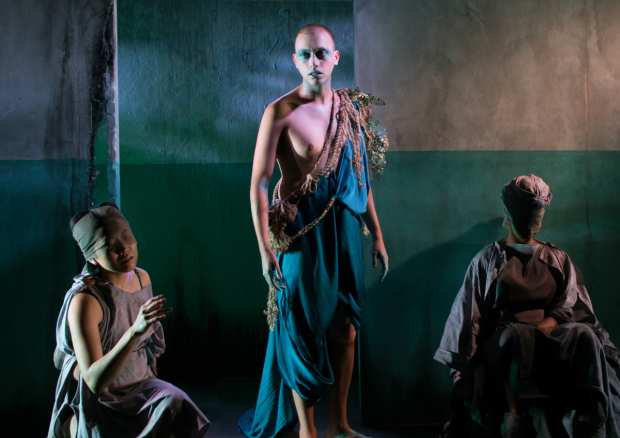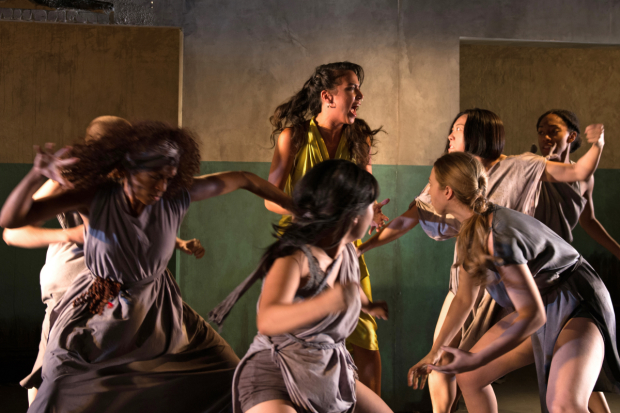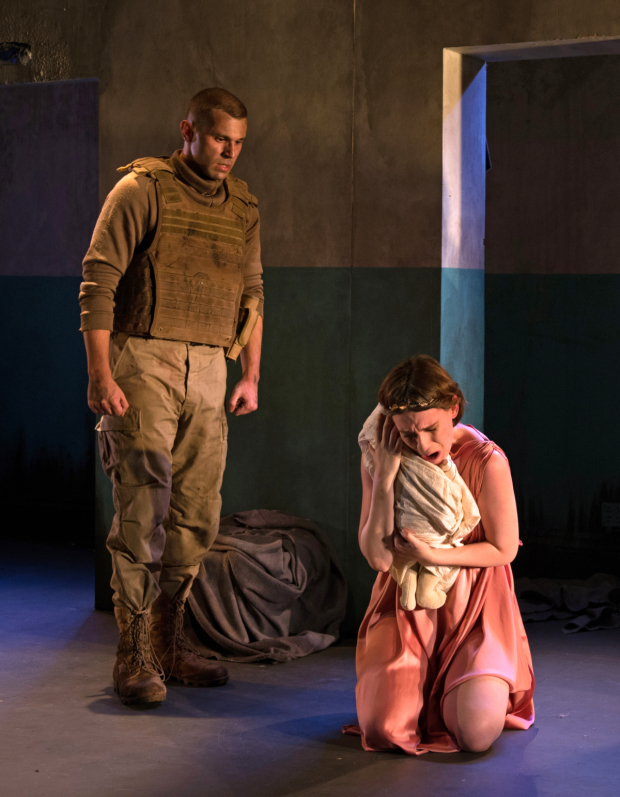The Trojan Women

(© Allison Stock)
The Trojan War is the conflict that launched a thousand plays. That includes Shakespeare's Troilus and Cressida (recently revived to great acclaim for Shakespeare in the Park) and Ellen McLaughlin's far more modest adaptation of The Trojan Women, which is receiving a solid and vibrantly acted production from The Bats at the Flea Theater.
The mythological war reverberates through the ages, finding fresh resonance with each new generation. Euripides first wrote The Trojan Women at the height of the Peloponnesian War between Athens and Sparta. Following the plight of the dispossessed women of Troy, it has often been hailed as the first anti-war play in the western canon. McLaughlin adapted it in 1995 in response to the Bosnian War, a brutal ethnic conflict that followed the breakup of Yugoslavia. Director Anne Cecelia Haney's smartly designed mounting is nonspecific in terms of aesthetic and time period, allowing audiences to relate the story to any number of wars presently raging across the world.
The play begins with the women waking up the morning after Troy's defeat. Hecuba (DeAnna Supplee) is the queen of a ruined city. Her clairvoyant daughter, Cassandra (the disturbingly comical Lindsley Howard, convincing us that she can really see the future), will be taken as a prize by King Agamemnon. Her widowed daughter-in-law, Andromache (Casey Wortmann), hopes to whisper the legacy of Troy to her young son when they are captive in Greece. All of the women blame Helen (Rebeca Rad) for their downfall, circling the legendary beauty like a pack of rabid Heathers.

(© Allison Stock)
Rad gives a memorably gruesome performance as the beaten-up Helen: Slobber drips from her mouth and where once dangled an elegant nose ring, a bloody wound remains. "Try to forget me. You will fail," she curses the women, but she very well could be talking to the audience.
McLaughlin has made some noticeable cuts. (What ever happened to Polyxena and Menelaus?) On the whole, though, her alterations have led to a dramatically stronger play. For instance, one of the problems with more traditional presentations of The Trojan Women is that Hecuba can often come off as a bottomless vessel of misery, pouring her self-pity all over the stage to the point where it barely registers. McLaughlin mitigates this by refocusing attention on the other women, while Supplee assists with an understated performance as the queen: Her numbness lets us know that she has no more tears left to give.
By contrast, Wortmann's portrayal of the hopeful Andromache is especially heartbreaking because of the way her character has not yet reached rock bottom, even when she thinks she has. When she learns that the victorious Greeks will throw her son from the walls of Troy, she tries valiantly to fight off a deluge of tears, eventually failing. Costume designer Marte Johanne Ekhougen outfits her in a tidy pink dress and headband like she's the Charlotte York-Goldenblatt of Troy: an innocent daughter of privilege whose stiff upper lip will be busted by circumstance before the play ends.
Remarkably, Phil Feldman manages to even elicit sympathy for the brutal Greeks in his portrayal of Talthybius, the bearer of bad news. His words are those of a soldier trying to rationalize the act of barbarism with which he has been tasked, but his sharp and darting eyes betray a man who will be haunted by the events of that day for the rest of his life.

(© Allison Stock)
Choreographer Joya Powell attempts to bring a sense of ritual to the stage with her specific gestures and interpretive dance, but it often feels like a massive distraction from otherwise earthy performances. In particular, a massive group dance about the ruse of the Trojan Horse ends up simply feeling messy.
The design elements prove much better at capturing the confusion of the day: Ben Vigus creates a compelling soundscape of conquered Troy, with crashing waves and clamoring church bells. He thrillingly collaborates with lighting designer Scot Gianelli to realize Troy's final, terrible destruction.
One might get the impression that The Trojan Women is only relatable to nations that have suffered a humiliating defeat, but McLaughlin uses the play to question the very notion of exceptionalism, which is not very exceptional in human society: "I was told one of my ancestors was a God," each of the women in the chorus says in an increasingly ridiculous succession as they bitterly laugh at their old stories of how Troy is blessed by the Gods. You may think the notion of a divinely nation blessed is quaint, but try telling that to every American politician at the end of every speech this year…or really, any year.











